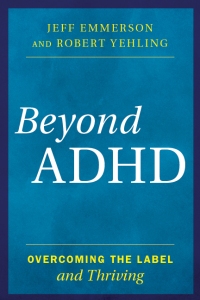(First of a 2-Part Series)
 I’ve been involved with many fascinating book projects over the years. However, none are as potentially impactful socially as Beyond ADHD: Overcoming the Label and Thriving, the book I wrote with Canadian ADHD expert Jeff Emmerson to be released globally by Rowman-Littlefield on August 16. You can pre-order it on Amazon.com.
I’ve been involved with many fascinating book projects over the years. However, none are as potentially impactful socially as Beyond ADHD: Overcoming the Label and Thriving, the book I wrote with Canadian ADHD expert Jeff Emmerson to be released globally by Rowman-Littlefield on August 16. You can pre-order it on Amazon.com.
Beyond ADHD is a critical book for our times. In the last 30 years, Attention Deficit Hyperactivity Disorder has gone from a rarely diagnosed disorder to an industry hundreds of billions of dollars in size, fed by all sectors of society. It involves:
- Ten percent of the North American population;
- Concerned educators, employers and parents who send fidgety or inattentive workers or kids to the doctor or school nurse’s office;
- Overworked doctors that prescribe quickly from nine-point checklists;
- Pharmaceutical companies (“Big Pharma”) eager to sell powerful prescription drugs that impact the patient’s biochemistry (often negatively);
- A compliant (until recently) media slanted heavily toward “diagnose-and-prescribe”, writing articles that spread the idea you can only treat ADHD with drugs;
- An equally compliant educational system, employees on the lookout for disruptive or hyperactive kids — and, in some cases, using approved course materials provided by Big Pharma, which promotes ADHD as a lifetime disorder, versus something we can get beyond;
- A U.S. Congress so heavily lobbied by Big Pharma (532 of the current 535 members received campaign contributions) that they won’t move to quash Big Pharma’s grip on pricing; and
- A public so gripped by busyness, technological and social stimulation that their neurological systems are overloaded. Many assume it to be ADHD or another mental health disorder diagnosed as fast as, well, a prescription can be written. If this dynamic sounds like a part of America’s woeful prescription drug story, well, it is.
Those are the departure points for Beyond ADHD. The book revolves around Emmerson’s life and experiences, instructive and harrowing at times, but also a cautionary tale into why you don’t diagnose someone with ADHD and give them powerful prescriptions in 15 minutes (the average time one spends in a doctor’s office before getting this diagnosis and prescription!).
I first met Emmerson via Twitter in late 2012, his chosen platform for discussing ADHD and mental health issues. What a platform it is, with more than 700.000 highly engaged followers, including medical, mental health and social health experts who worked with us on Beyond ADHD. He also has a large video blog audience, and more than 15,000 LinkedIn followers. After a difficult first 35 years of life, Emmerson was diagnosed with ADHD in 2011. In 2015, he met with Michigan-based neuroscientist Dr. Timothy Royer, who shattered the diagnosis after considerable testing — which led to this book.
With four weeks until Beyond ADHD releases, I decided to interview Emmerson, to give you a taste of his forward-thinking perspective, one that brought me right to the table to co-author this book. In this first part of our interview (part two will be posted Friday, July 21), you can see in Emmerson’s answers numerous options, causes and ways of working with this that, frankly, are woefully underused.
WordJourneys: What inspired and motivated you to create Beyond ADHD?
Jeff Emmerson: My own journey through the mental health system. Or, to be more specific, how I was diagnosed with ADHD after a suicide attempt in 2011 and what I discovered when my intuition told me to dig deeper into other possible reasons for the symptoms and battles I’ve faced for many years. I saw a desperately failing diagnostic system that made rushing to diagnosis way too common. I knew I had to speak out so that others might be able to avoid the “murky waters” of misdiagnosis through deeper understanding of just how faulty ADHD diagnosing is for millions.
WordJourneys: What are the three biggest issues with the way we currently diagnose and prescribe ADHD?
Emmerson: Number One: Not ruling nearly enough out first through a collaborative, inter-disciplinary team approach that treats ADHD/ADD as a diagnosis of exclusion (not the other way around);
Number Two: Not making other interventions (instead of simply medication) just as high of a priority (such as behavior therapy, brain training, nutritional counseling, looking at alternate learning/schooling options, physical activity, creative outlets, trauma at home being assessed, etc.);
Number Three: Not digging deeper after a diagnosis is made, and/or assuming that medication use needs to be permanent. Self-resilience and accountability must be held to very high standards as part of treatment. In other words, treat the whole person, not simply diagnose, medicate and leave them to their own devices without on-going support and education into self-reliance and growth.
WordJourneys: Why is ADHD diagnosed at such a high rate now? Do we really have that many afflicted adults and children, or is it something else?
Emmerson: My deepest fear (and gut feeling) is that so-called ADHD (in millions of cases) is a band-aid diagnosis made because we simply don’t have the knowledge, research or resources to dig deeper and actually address some key contributing issues no one talks about: chemicals in tap water, air quality, societal “norms” industry-wise, increasing tech addiction, poorer sleep quality, and many other root causes for symptoms. Instead, we use stimulant medication to see if it “works” and leave it at that (assuming ADHD and making it a potentially permanent diagnosis on someone’s medical records, a whole other issue for several reasons).
WordJourneys: The education system has played an increasing role in getting kids to ADHD diagnoses. Is this a good or bad thing — and why?
Emmerson: This infuriates me, and here’s why: Some kids may benefit from diagnosis and treatment, but factors such as date of birth (what time of the year a child is born), learning differences, root-cause factors for ADHD-like symptoms (many of them) and other issues are way too easily turned into a rushed ADHD diagnosis. Frankly, much of our education system is antiquated and obsolete in relation to the technological age we’re living in, so we need to hold education policy makers to task, just as much as we weed out children who seem to be acting out in any number of ways. After all, some of the world’s most innovative and creative people disliked conventional school very passionately. We need to do something about this desperate need for wholesome, 360-degree learning to become the norm (to start with, anyway).
WordJourneys: What are the challenges facing doctors and mental health professionals in treating the whole person, rather than just the ADHD?
Emmerson: Resources. Funding for thorough, holistic care is scarce in the United States, especially in the mental health realm, and there is heavy pressure to reduce that even further. What’s even bigger is that investments in education toward self-awareness, resilience, and extra-curricular activities, and incentives for families to stay healthy both physically and emotionally, are dwindling away. The unfortunate reality for many healthcare professionals is that insurance companies and profits for medical practices push more and more patients to be seen in shorter and shorter time-spans, resulting in rushed, insufficient care. Profits can still be made while taking the proper time to treat patients holistically and fully. We just need to help the system evolve and incentivize providers in new ways that benefit all.
(Part 2 will appear Friday, July 21, on The Word Journeys Blog.)



